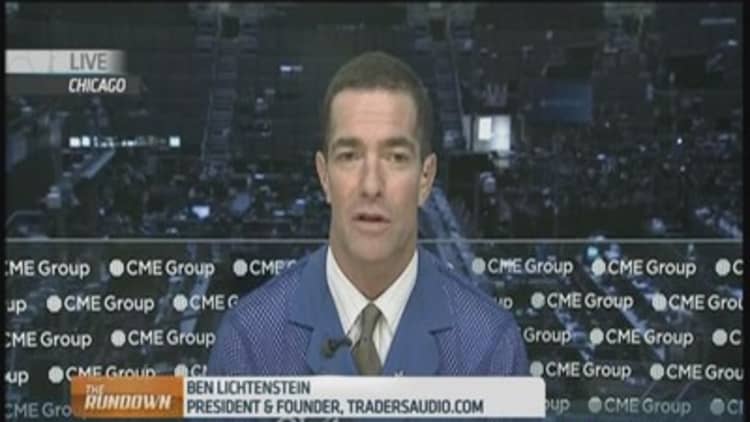It's crystal-ball time for market watchers and Goldman Sachs is no different, outlining its top-10 themes for 2015, with its eyes on the economic recovery, China, oil and emerging markets.
Broadening recovery
The first theme: A broadening economic recovery, with the U.S. to remain the primary engine of global growth, while Japan and the euro area are set to look a little better, at least compared with this year.
Read More No recession in 2015, but no growth either: BofA ML
"The developed market activity picture should look a little better overall. And although China's growth is likely to slow further in underlying terms, other parts of emerging markets should also see better growth as the developed market recovery flows through," it said, adding its forecasts are higher for 2015.
Developed market divergence
Divergence among developed markets is the next theme, with the gap between U.S. and European growth likely to remain wide and even widen on an annual average basis, it said.

Oil price declines
Goldman also expects a "new oil order," after the $30-a-barrel fall in prices since around mid-year.
"While it would be natural to see a period of consolidation after such sharp moves (and our forecasts show limited further downside from here), it is important to note that the scope for downside surprises is not finished," it said. "A material expansion in oil service capacity in recent years is likely to lead to 5-15 percent cost deflation across oil developments, and positive production surprises from Libya, Iraq and Iran could further reinforce an oversupplied market in the coming year."
Read More Why the global economy could be in trouble (again)
The knock-on effects will be "significant," likely reinforcing downside risks in other commodity prices such as copper and aluminum and reinforcing a disinflationary push globally, while also helping to boost disposable income in oil-importing countries, it said.
Countries where oil and commodity exports are key revenue sources are likely to feel the heat, facing currency weakness, fiscal spending squeezes and declines in investment, Goldman said.
U.S. dollar strength
, especially against other G-10 nations' currencies, will remain another key theme, it said.
Read More Are low oil prices here to stay?
"Continued declines in the euro-dollar rate are the single most important element, but we expect further meaningful weakness in the Japanese yen as well," it said, citing widening differentials between two-year interest rates, declining oil prices and a resilient U.S. growth picture.
It forecasts the euro will fetch only $1.15 by the end of next year and parity in 2017, compared with around $1.25 currently, while the dollar will buy 130 yen by end-2015, compared with around 118 yen currently.
China growth
Another key theme is China's "bumpy downshift," with any gains in mainland-linked assets likely limited next year, it said.
Not only will month-to-month changes in activity and policy be watched closely, but efforts to deal with excessive corporate and local-government leverage and an oversupplied housing market will also simmer, Goldman said. It expects China's economic growth will slow to 6-7 percent over the next couple years.
Healthier emerging markets
Other emerging markets will enter 2015 in better health compared with last year, Goldman said in another theme
Commentary: Why oil is more likely to test $50 than $100 again next year
"External imbalances have improved in several countries, with India, Thailand and Chile among the stand-outs. And the disinflationary impulse from lower international food and oil prices is driving headline emerging market inflation lower everywhere," it said, adding local-currency emerging market bonds will likely perform well.
But it also expects more polarization within the segment between countries addressing macroeconomic imbalances as well as those on the "right side" of the oil import/export divide.
The other four themes?
There's lowflation and efforts to battle it, especially in the Eurozone, Goldman said, citing the effects of quantitative easing by the Bank of Japan and potentially the European Central Bank.
Read More Why 2015 may also be a good year for stocks
Expectations the U.S. Federal Reserve's first rate hike will come relatively later than sooner will also remain a key market theme, it said, citing its expectations it won't come until September of next year. But it added it expects the Fed will raise rates faster than much of the market expects.
Another key theme is "the Great Re-Moderation," it said, with market volatility likely to remain low, it said.
The last theme? Living in a low-return world.
"Many asset prices are priced to offer low absolute rates of return over the coming years," Goldman said, expecting equity multiples will remain above average and possibly move even higher. "Upside may be less compelling than it has been, and our forecasts are for relatively modest nominal returns outside Japan and parts of emerging markets."
—By CNBC.Com's Leslie Shaffer; Follow her on Twitter @LeslieShaffer1



